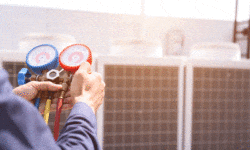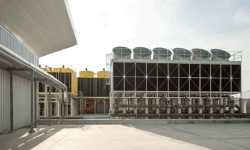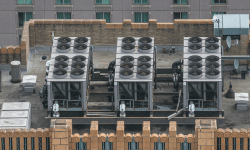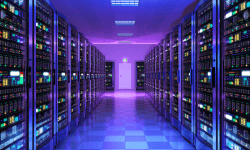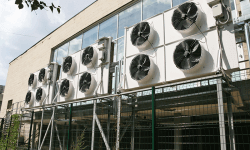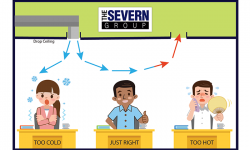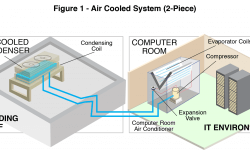Office humidity is extremely important for every building. If it’s too high or too low, it can affect your health, the building materials, the equipment and more. According to the American Industrial Hygiene Association (AIHA), uncontrolled humidity levels are one of the main factors for poor indoor air quality (IAQ). So, what is the right humidity level?
Read more →For your commercial HVAC system to run at peak efficiency, it needs to be sized just right for your facility. If not, you could face issues, like higher energy bills or temperature fluctuations. Here’s why HVAC system size impacts efficiency and what goes into calculating the size of your HVAC unit.
Read more →Cooling towers can be breeding grounds for Legionella, the bacterium responsible for causing Legionnaires’ disease. As a facility manager or operator, it’s your responsibility to ensure that regular maintenance helps to control Legionella growth and keep your workers and patrons out of harm’s way. Below, you will learn everything you need to know about this serious disease and how you can prevent Legionella in your cooling towers with proper cooling tower cleaning procedures.
Read more →When you run a business and have a commercial HVAC system, it can be hard to keep things cool during the summer. The heat is naturally going to seep in. It’s important to make sure that your HVAC system is working properly so that your employees and customers are comfortable. Read on for some summer HVAC tips that can help prepare you for the warmer weather.
Read more →If you are interested in generating energy savings in the home, an HVAC economizer may be the way to go. For most homeowners, saving energy is a necessity and upgrading your HVAC system is a great way to see a significant change in overall energy usage. Read on to learn more about the benefits of an HVAC economizer, as well as how it works and where it can be installed.
Read more →A commercial building requires a large HVAC unit or several units to provide comfort. During the hot summer months, temperatures can rise quickly, and over time a commercial A/C unit or HVAC system will require repairs or even replacement. If the unit is older, consider replacing the system to provide better indoor air quality, energy efficiency, and comfort. But how do you know when its time to replace your unit? Read on to learn about the common signs that your commercial A/C is ready for replacement.
Read more →Managing the temperature through compressors or ACs is a very expensive process. Cooling makes up at least 40 percent of your monthly energy consumption, which can quickly eat up your budget. Without HVAC, however, data centers would feel like the Sahara at the height of summer. This is why IT managers are trying to find ways to decrease temperature levels without racking up the electricity costs.
Read more →When it comes to designing HVAC systems, many manufacturers are switching to energy efficient models and design methods. In fact, many factors go in to designing an efficient HVAC system, and this article will focus on those elements. Read carefully and take into consideration these tips on the fundamentals of efficient HVAC design. Upon reading, you will gain more insight into designing an HVAC system, as well as understand what to look for when purchasing a new HVAC system.
Read more →In heating, ventilation, and air conditioning (HVAC) there are systems that cool and heat forced air. Forced air is a central heating system that uses air as its medium to transfer heat. This system relies on vents, duct work, and plenums for building air distribution that is separate from actual cooling or heating systems.
Read more →Data centers and IT rooms are becoming an integral part of businesses across the globe. And, as technology continues to change and evolve, computing equipment is being created in smaller sizes. However, the smaller size uses more electricity and can generate more heat, which creates a need for heat removal. So, it is essential that such spaces have precision cooling and heat rejection equipment in order for the equipment to stay at an even temperature and avoid overheating. There are several heat removal methods in which cooling equipment can be used to mediate the high heat generated by the computing equipment.
Read more →
